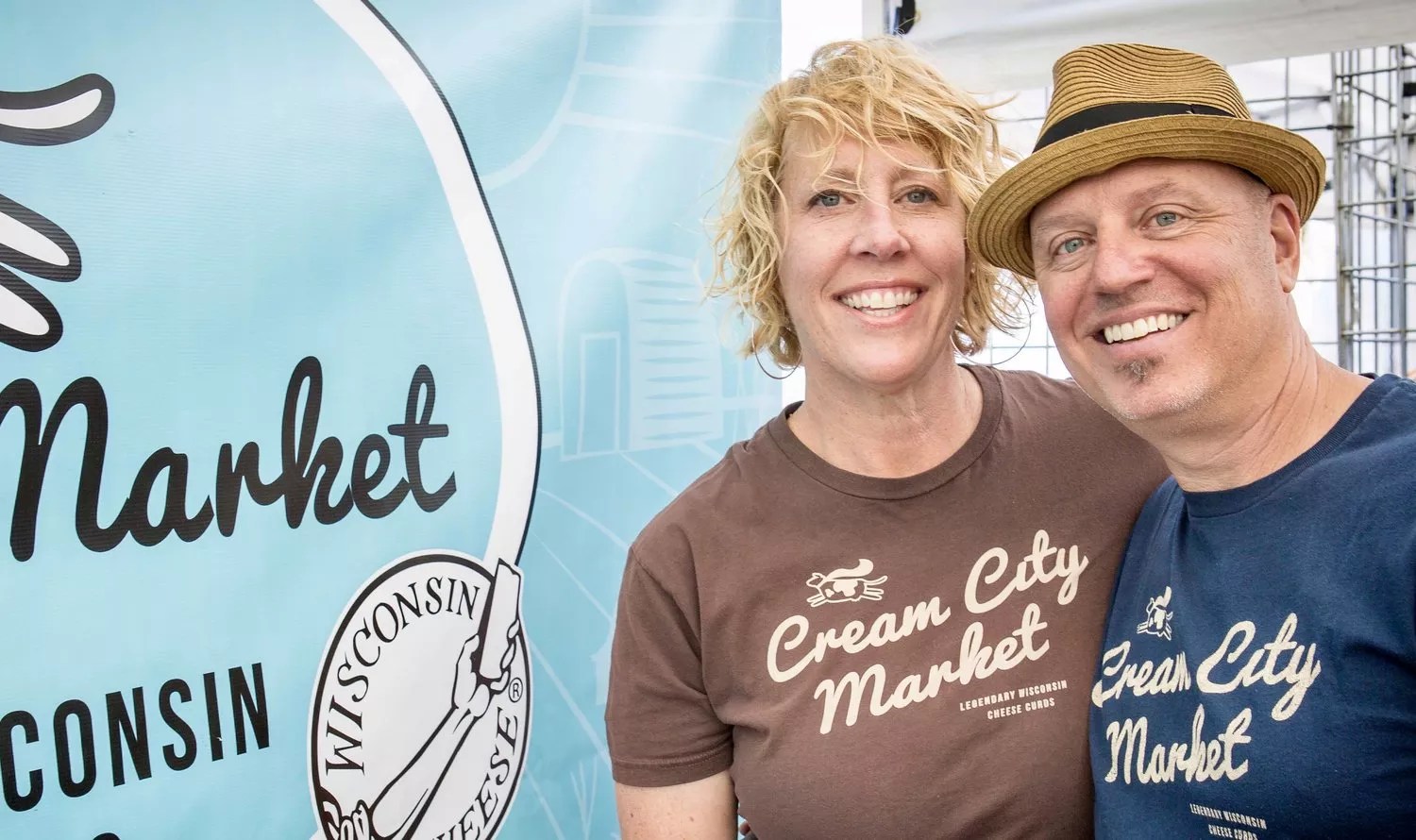
Cream City Market

Audio By Carbonatix
Farmers’ market season is back. No matter your neighborhood, you can find local produce and handcrafted goodies near you. In Farmers’ Market Finds, recipe developer and freelance writer Ashlee Redger highlights some standout local farmers’ market vendors and dishes up a recipe using their goods.
Vendor: Cream City Market
Where to find it: The Erie Farmers Market on Thursday evenings; Littleton Southwest Plaza, Westminster and Lousiville markets on Saturdays; and the South Pearl Street, Parker and Arvada markets on Sundays. A complete list of farmers’ market locations (including a few in Wyoming) and retail locations can be found on the Cream City Market website.
For more info: Visit creamcitymarket.com
About the business: Kim and Mark Albrecht have dubbed themselves “cheese curd ambassadors.” As born-and-raised Wisconsinites, they grew up snacking on the little nuggets of cheddar, which squeak against your teeth when you chew them (as long as they’re fresh). Unfortunately, fresh cheese curds can be hard to find outside of Canada and the northern Midwest. For the last nine years, the husband-and-wife team has been on a mission to bring the treasures of America’s Dairyland to the Centennial State.

Cream City Market is run by Kim and Mark Albrecht with help from their son, Luke.
Cream City Market
The Albrechts first became enamored with Colorado in 2012. They had come to drop their son off at school. A few days into the visit, Mark remembers thinking, “What could we do here?” He had worked in manufacturing sales and advertising for 25 years, while Kim worked in retail. Both had side gigs as musicians, too, working on the music team at their church, teaching piano lessons and playing in bands.
“[We were] really, really, really busy, with three or four different things going on simultaneously,” Mark says. While visiting, they found one subject coming up again and again: cheese curds. When strangers found out the Albrechts were from Wisconsin, they would lament the lack of cheese curds in Colorado.
Surprised, the couple looked around in grocery stores and confirmed: There just weren’t readily available cheese curds in Denver, especially not the super-fresh and squeaky ones that they were used to back home, so Kim and Mark started to hatch a plan. “I think we had reached the extent of where we wanted to go with our current jobs and careers,” Mark says. So they decided to “import” cheese and dairy products from their favorite creameries in Wisconsin and sell them at local farmers’ markets around Colorado.
They didn’t call the moving vans right away, though. The next year, Kim and Mark spent a weekend selling at farmers’ markets in Colorado to see if their dream was actually viable. After their third successful market of the weekend, it was decided. They sold their house in Wisconsin and moved in January 2014. They’ve been slinging cheese full-time ever since.
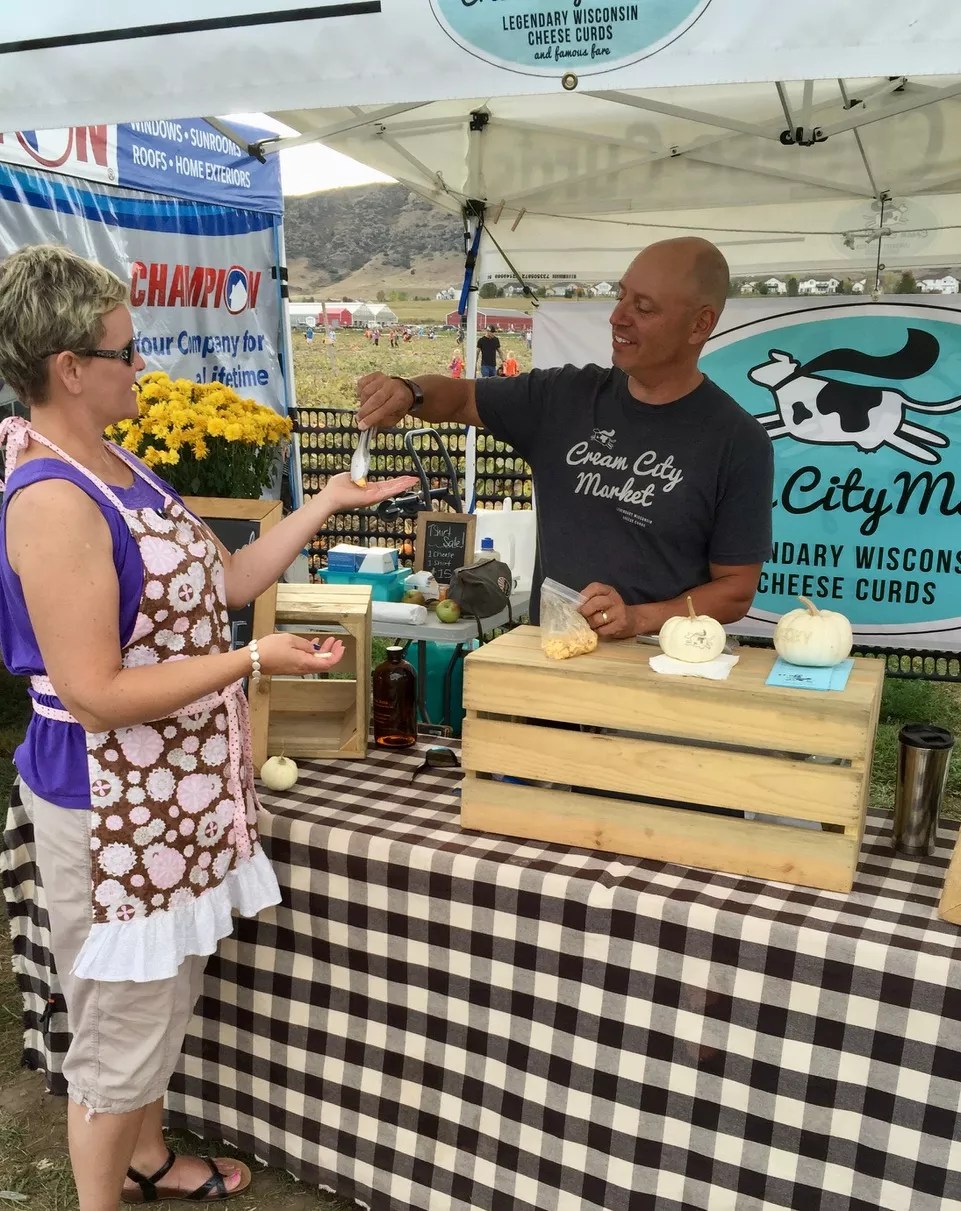
After falling in love with Colorado, Kim and Mark Albrecht moved to Denver to start Cream City Market.
Cream City Market
Kim and Mark agree that establishing Cream City Market has been a natural transition. “Because we had different careers over our lifetimes, we brought different skills and experience, so we did not have such big growing pains that some other small businesses experience,” Kim notes. “We’ve pretty much landed and been going strong ever since.”
Mark also attributes their success to planning. Before moving, they had a year and a half to develop their brand, logo and business plan. “We didn’t have any cultural shocks or shifts that we had to suddenly pivot on because we knew ahead of time what the market was going to bring to us,” he explains. “It’s just worked like clockwork for us.”
To source products in the beginning, Kim and Mark went on a “taste-testing journey” to evaluate all the dairy they had loved throughout their lives in Wisconsin. The producers they work with have been making cheese for generations, plus they even have the hard-earned distinction of being Master Cheesemakers. “Our cheese has four ingredients, or five ingredients if it’s orange,” Kim explains. It’s also made from antibiotic- and growth hormone-free dairy.
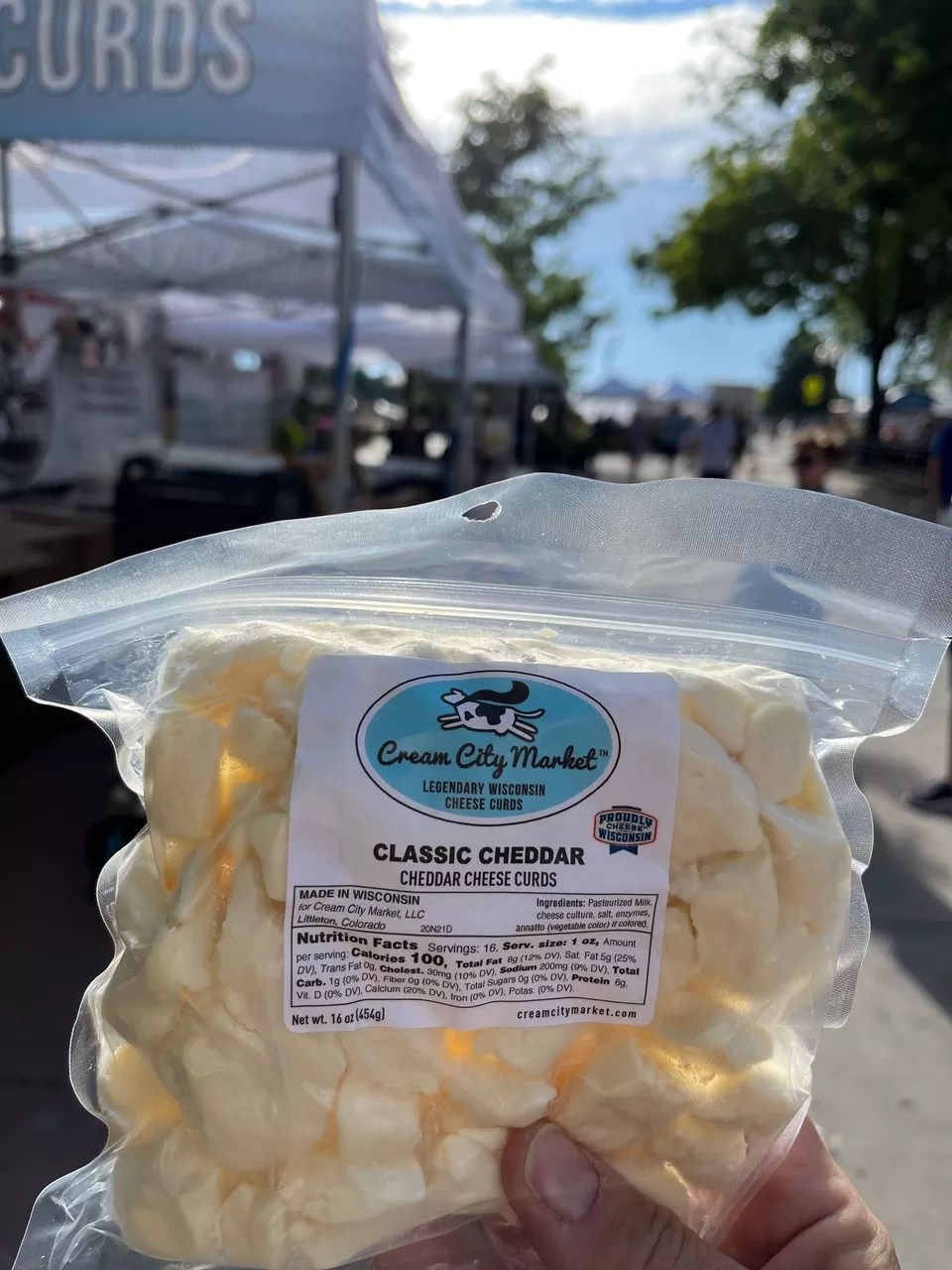
For cheese curd newbies, Cream City Market’s Classic Cheddar is a great place to start.
Cream City Market
Cream City Market works with its partners to get cheese shipped or flown in specifically for the market schedule to make sure it’s as fresh as possible. While they have seen opportunities to grow arise from their success so far, Kim and Mark like keeping it small. “Some farmers’ market businesses have a presence at literally every market in the entire metro area,” Kim says. “We tried a little bit of that and just felt like it wasn’t for us. … We love being with customers. If I had to step out of a market so that I can help manage the business, I would lose what brings me joy.”
Even with the help of their son, Cream City Market can only be at three farmers’ markets on any given day during the summer. Its offerings can also be found at a few retailers, like EVOO Marketplace and Hazel’s Beverage World, year-round.
Plain cheese curds aren’t the only thing that Cream City Market sells. There are flavored curds, like ranch, jalapeño and garlic dill as well as mozzarella “whips” (which are like string cheese, but longer, thinner and fresher), sliceable brick cheese and handmade butters.
This year, it’s adding seasonal butter flavors like strawberry and lavender-honey. Fan-favorite habanero cheese curds will also make appearances throughout the season.
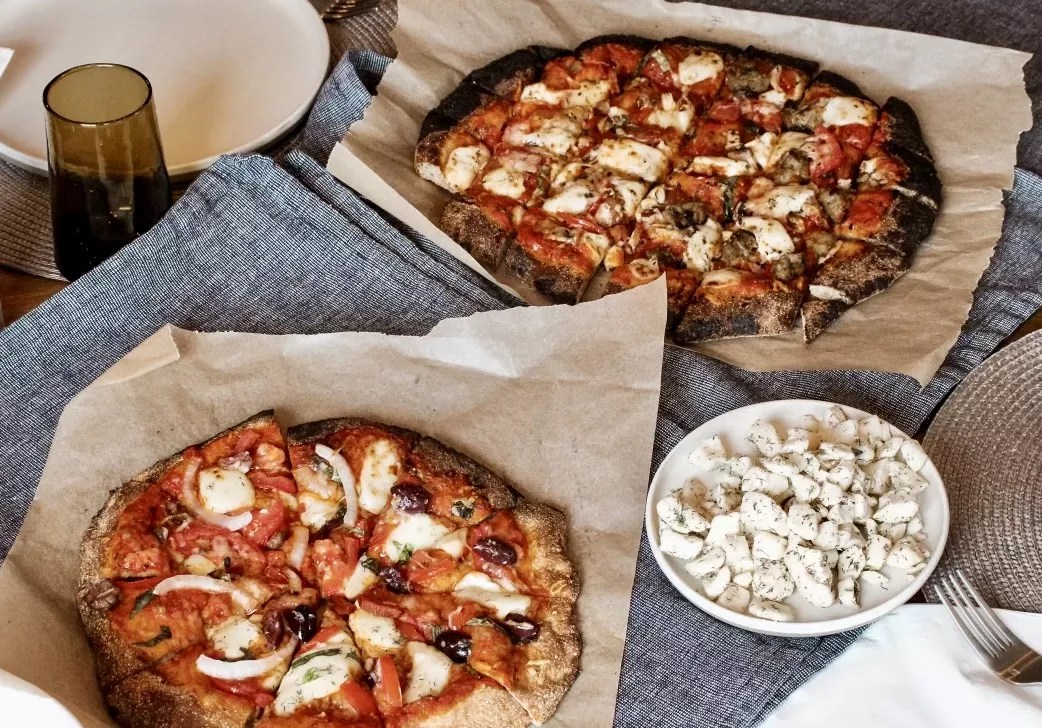
Cheese curds don’t melt as readily as other cheeses. Instead of spreading out, they turn into warm, soft cheese bites when cooked.
Cream City Market
How to use it:
“Mostly, in Wisconsin, we just eat the cheese curds out of the bag on the way home,” Mark jokes. If you’ve had cheese curds in a restaurant, chances are they came to you battered and fried or dotted on top of gravy-laden poutine. While both are excellent options, curds offer a unique opportunity in other dishes, too.
Because they have a fairly high melting point, they can be worked into just about anything, resulting in guaranteed pockets of cheesiness. Stir them into pasta, fold them into scrambled eggs or knead them into homemade bread or biscuits. They can even be grilled or seared in a skillet, halloumi-style.
One of Mark and Kim’s favorite uses is to add a handful of curds to ground meat for an easy take on a Juicy Lucy burger. This proved to be a hit with turkey, which really let the flavor of the garlic and dill cheddar curds shine (recipe below), but you can also sub in any ground meat or meat substitute that you prefer.
For more recipe suggestions like pierogi poutine and Cream City Caprese, visit Cream City Market’s website.
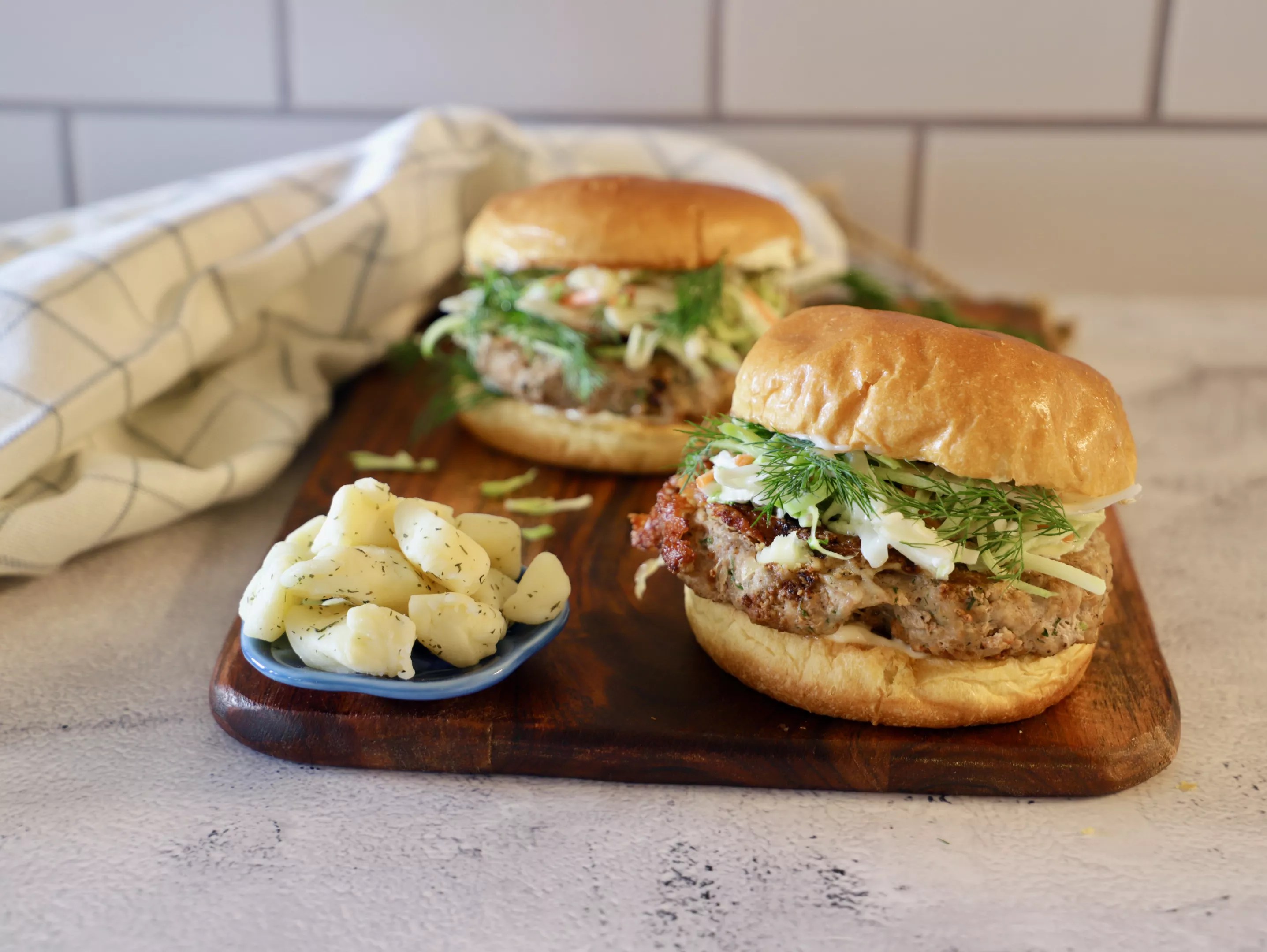
Get cheesy pockets in burgers, omelets and biscuits by mixing in cheese curds before cooking.
Ashlee Redger
Garlic & Dill Cheddar Turkey Burgers
Makes 2-4 burgers, depending on desired patty size
- 1 pound ground turkey (85/15 is best here)
- 1/2 cup Cream City Market cheese curds, large pieces cut in half
- 1 tablespoon chopped chives and/or dill (optional)
- Salt & pepper, to season
- Combine turkey, cheese curds and herbs. Gently fold and mix with clean hands until the mix-ins are well distributed throughout the meat. Split burger meat into two to four portions, then shape each portion into a four-inch patty. Season the patties all over with salt and pepper.
- Grill or sear in a cast-iron skillet over medium-high heat until the turkey reaches an internal temperature of 160°F, about three to four minutes per side. Some of the cheese around the edges of the patties will start to melt – this is okay! Let it caramelize on the pan, then scrape it back onto the patty.
- Let the burger patties rest for five minutes, then serve with your favorite burger accoutrements. Here, we used toasted brioche buns, lightly dressed broccoli coleslaw and fresh dill leaves. Other suggestions include pickled red onions, fried shallots and homemade ranch.
Bonus Farmers’ Market Finds: Produce season is still ramping up, but now is a good time to get your farmers’ market routine down pat. Find your new favorite coffee cart and pick a go-to pastry stand for the season (pro tip: Reunion Bread Co will be making appearances at the Saturday Cherry Creek markets again after a five-year hiatus, and you have to get to South Pearl Street early if you want the full lineup of Rebel Bread treats). Here are a few more things to look out for this month:
- Leafy greens, herbs and cucumbers are some of the first crops available every year. They’ll be harvested all summer. The same goes for potatoes and hydroponic tomatoes. Asparagus, on the other hand, is in its brief peak. Grab some bundles before mid-June for the sweetest stalks.
- Moon Raccoon Baking Co. is a delightful micro-bakery founded by two pastry chefs, Zoe Lange and Kate Deutsch. The duo is dishing up sweet pastries like Thai tea cruffins, kanelbullar (Swedish twisted cinnamon buns) and rye chocolate chip cookies this month. Find Moon Raccoon’s full May menu and schedule on Instagram.
- If you’re looking to grow your own produce this year, vendors like WeeBee Farms have plant starts and flowers that have been locally cultivated from seed.